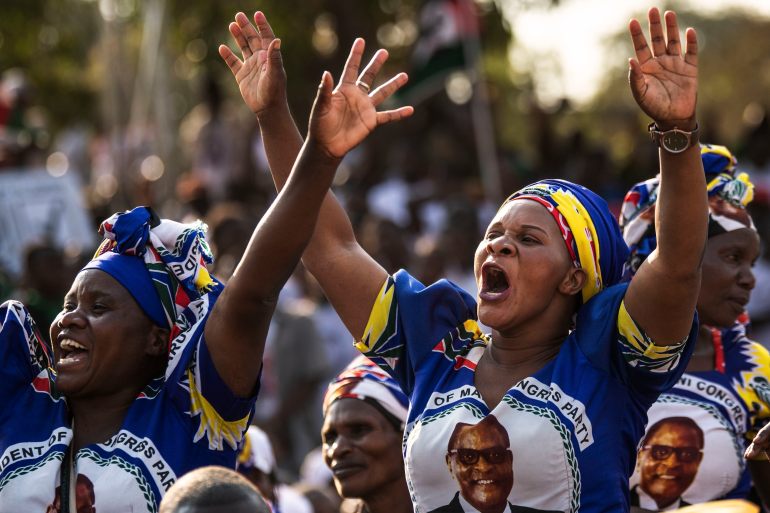
Malawi presidential elections: Who is running and what’s at stake? | Agriculture News | Al Jazeera

Malawi Presidential Elections: Candidates and Implications
As Malawi approaches its presidential elections, the political landscape is charged with tension and anticipation. The small Southeast African nation is grappling with significant economic challenges, including double-digit inflation and the aftermath of last year’s devastating drought, which has left many citizens struggling to make ends meet. This election is pivotal, as it could shape the country’s future and address pressing issues affecting its citizens.
Economic Challenges and Climate Vulnerability
Malawi has been severely impacted by economic turmoil, with inflation rates soaring and food prices skyrocketing. The country has seen food costs increase by approximately 30 percent over the past year, while wages have stagnated, exacerbating the struggles of everyday Malawians. The situation has been worsened by a series of extreme weather events, including Cyclone Freddy, which struck in early 2023, resulting in over 1,200 fatalities and widespread destruction of crops and livelihoods.
The impact of climate change is particularly acute in Malawi, which is considered one of the most climate-vulnerable nations despite contributing minimally to global emissions. The majority of the population relies on subsistence farming, making them highly susceptible to the repercussions of climate shocks. Activists like Chikondi Chabvuta emphasize the need for robust food systems and policies that can withstand these challenges, particularly for women and girls who are disproportionately affected.
Candidates in the Race
Lazarus Chakwera
Lazarus Chakwera, the 70-year-old incumbent president and leader of the Malawi Congress Party (MCP), is seeking re-election for a second and final term. Chakwera’s presidency has been marked by ambitious infrastructure projects and the promise of economic reform. However, his administration has also faced significant criticism for high inflation rates, fuel shortages, and allegations of nepotism, particularly following the appointment of his daughter, Violet Chakwera Mwasinga, as a diplomat in Brussels.
Chakwera has attributed many of the country’s economic hardships to external factors, including the previous year’s drought, a cholera outbreak, and the devastation caused by Cyclone Freddy. In his campaign, he has called for patience from voters, asserting that his government needs more time to address the economic stagnation.
Peter Mutharika
Opposing Chakwera is Peter Mutharika, the 85-year-old leader of the Democratic Progressive Party (DPP) and former president of Malawi from 2014 to 2020. Mutharika is attempting a political comeback after losing to Chakwera in the historic 2020 rerun election, which followed a court ruling that found irregularities in the 2019 election. Mutharika’s campaign emphasizes the economic gains during his presidency, arguing that the current administration has failed to maintain the progress he claims to have achieved.
Despite his experience, Mutharika’s age has raised concerns about his vitality and engagement in the campaign. Critics have noted that he has not been particularly active in public appearances, which could affect his support among younger voters.
Joyce Banda
Another notable candidate is Joyce Banda, a former president of Malawi who has pledged to combat corruption if elected. Banda made headlines in 2013 when she dismissed her entire cabinet following a cash scandal involving government officials. Her return to the political arena adds another layer of complexity to an already competitive election.
The Election Landscape
With a total of 17 candidates vying for the presidency, the election is largely seen as a contest between Chakwera and Mutharika. To win outright, a candidate must secure more than 50 percent of the vote; otherwise, a runoff will be necessary. The official results are expected to be announced by September 24.
Public sentiment is mixed, with many citizens expressing frustration over the rising cost of living. Protests erupted earlier this year in major cities like Lilongwe and Blantyre, where citizens demonstrated against the escalating prices of food and fuel. Young voters, in particular, have voiced skepticism about the effectiveness of their votes, questioning whether any significant change will occur regardless of the outcome.
Global Economic Context
In May 2023, the International Monetary Fund (IMF) terminated a $175 million loan program due to the Malawian government’s failure to deliver early results. Only $35 million of the loan had been disbursed, and discussions for a new program are anticipated post-election. Malawi’s economy is heavily reliant on foreign aid and is under pressure from accumulating external debt, complicating the financial landscape for the next administration.
Conclusion
As Malawi heads to the polls, the stakes are high. Voters are faced with critical issues that will determine the future direction of the country. With the economic crisis deepening and the impacts of climate change looming large, the next president will need to address these challenges head-on to foster a more resilient and prosperous Malawi.
Key Facts
– **Candidates**: Lazarus Chakwera (incumbent) and Peter Mutharika (former president) are the leading candidates, with Joyce Banda also in the race.
– **Economic Issues**: Malawi is experiencing double-digit inflation and rising food prices, with costs increasing by about 30% over the past year.
– **Climate Vulnerability**: The country is one of the most climate-vulnerable nations, heavily reliant on subsistence farming.
– **Election Date**: Presidential results will be published by September 24, 2023.
– **Public Sentiment**: Protests have occurred in response to rising living costs, with many young voters feeling disillusioned about the electoral process.
Source: www.aljazeera.com
